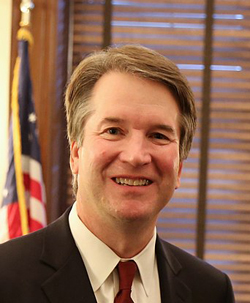Kavanaugh email shows offer to prepare ex-AG Ashcroft on attorney-client monitoring issue

U.S. Supreme Court nominee Judge Brett Kavanaugh via Wikimedia Commons.
A 2001 email released Thursday is likely to raise new questions about U.S. Supreme Court nominee Brett Kavanaugh’s involvement in terrorism policies when he was an assistant White House counsel in the George W. Bush administration.
In the email, Kavanaugh offered to help then-Attorney General John Ashcroft prepare for congressional testimony on the monitoring of attorney-client conversations of some terrorism suspects, report the New York Times and Politico.
According to the Times, the Justice Department had informed some federal prisoners that their attorney-client conversations were being monitored to make sure they weren’t passing messages to terrorists.
Ashcroft later testified it was appropriate to monitor conversations of 16 inmates as long as the information wasn’t used in prosecutions. It’s unclear if Kavanaugh actually helped Ashcroft prepare.
Kavanaugh’s email responded to a request for help preparing Ashcroft to testify about DOJ actions after the Sept. 11 attacks, including the topics of military tribunals, monitoring of attorney-client conversations and racial profiling.
Kavanaugh forwarded the email to a colleague who handled terrorism detainee issues with the message: “I am happy to help out with this on the attorney-client issue, but you should obviously handle tribunals.”
Kavanaugh was also reportedly involved in a 2002 meeting when he was asked how he thought Justice Anthony M. Kennedy would vote on an issue regarding detainees at Guantanamo Bay. Kavanaugh was a former Kennedy clerk.
Sen. Dick Durbin, D-Ill., has said Kavanaugh’s participation in the meeting conflicted with his 2006 testimony during his confirmation hearing for a seat on the U.S. Court of Appeals for the D.C. Circuit. On Thursday, Durbin said “the cherry-picked documents we’ve seen so far” include evidence that contradict the prior testimony.
During the 2006 hearing, Durbin asked about another nominee’s role in interrogation and detention policies. “Senator, I did not, I was not involved and am not involved in the questions about the rules governing detention of combatants or—and so I do not have the involvement with that,” Kavanaugh replied.
Another senator asked Kavanaugh whether he saw any documents relating to the administration’s policies and practices on torture. Kavanaugh replied: “I think with respect to the legal justifications or the policies relating to the treatment of detainees, I was not aware of any issues on that or the legal memos that subsequently came out until the summer, sometime in 2004 when there started to be news reports on that. This was not part of my docket, either in the counsel’s office or as staff secretary.”
The White House released a statement to Politico by Alberto Gonzales, who was White House counsel at the time. “To the best of my recollection Brett Kavanaugh was not involved with the legal issues surrounding the authorization of the use of enhanced interrogation techniques on high-value detainees,” Gonzalez said. “At the time, a very limited number of personnel in the White House and at the Justice Department were read into that sensitive issue. Brett was not.”
See also:
ABA Journal: “Date announced for Supreme Court nominee Kavanaugh’s confirmation hearings.”
ABA Journal: “Kavanaugh memo in’98 urged independent counsel Starr not to pursue Clinton indictment while in office.”
ABA Journal: “Did Kavanaugh’s ‘one race’ assertion signal a vote against racial preferences?”
ABA Journal: “ABA committee to evaluate Trump’s Supreme Court pick.”
ABA Journal: “Kavanaugh praised Rehnquist’s stand against unenumerated rights in Roe v. Wade dissent.”
ABA Journal: “Meet Brett Kavanaugh, Trump’s nominee for the Supreme Court.”



